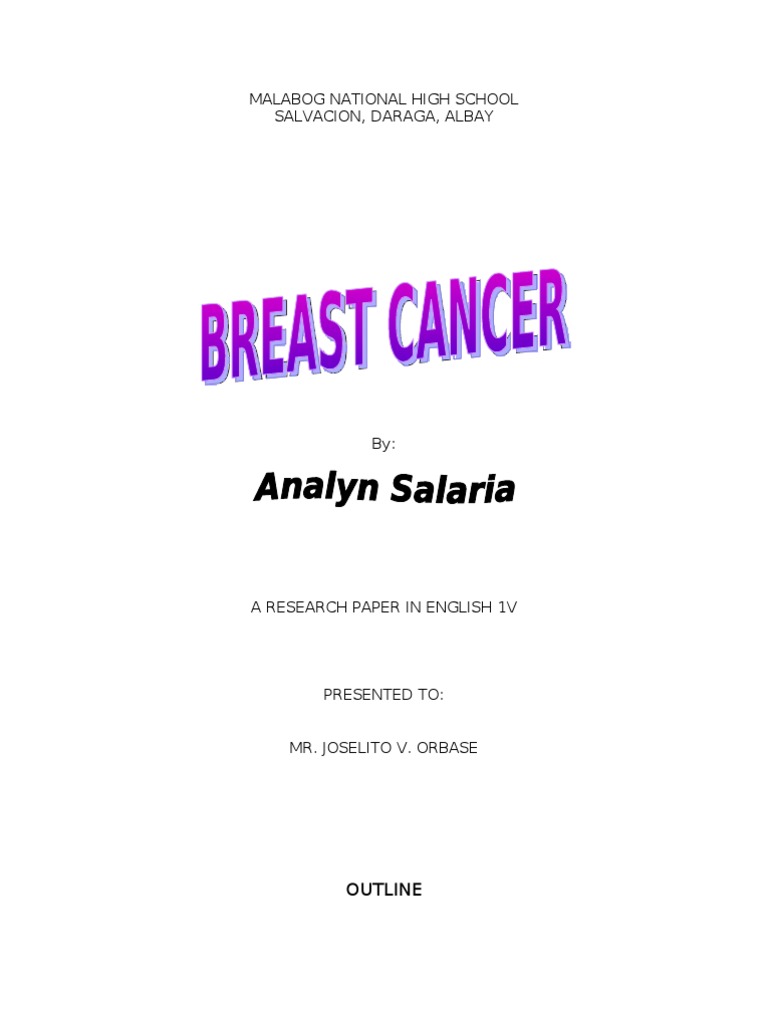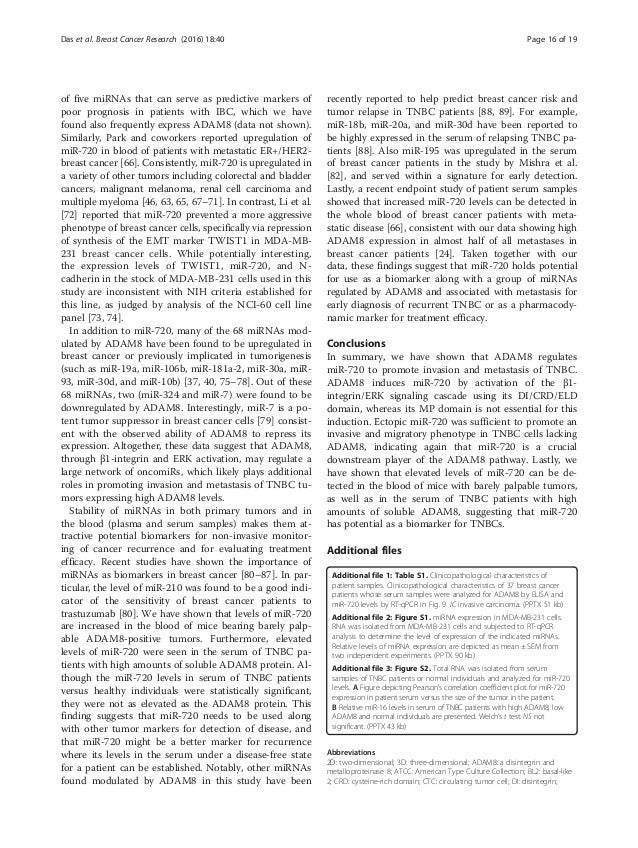
Sep 02, · By Shelby Stewart Staff Writer A Brandon High School grad is making strides in the research of triple-negative breast cancer. “My dissertation research was based on finding new ways to kill the most aggressive and deadly type of breast cancer, known as triple-negative breast cancer,” said Bill Tahaney, a BHS Grad Sep 25, · University of Helsinki led research project that partners with the University of California, San Francisco, was awarded a Breast Cancer Research Program Breakthrough grant from the US Department Aug 12, · Breast cancer is a complex and heterogeneous disease. Gene expression profiling has contributed significantly to our understanding of this heterogeneity at a molecular level, refining taxonomy based on simple measures such as histological type, tumour grade, lymph node status and the presence of predictive markers like oestrogen receptor and human
Breast cancer | World Cancer Research Fund International
Identifying which environmental factors may increase the chance of developing breast cancer is the first step in figuring out how to avoid them. will research papers on breast cancer breast cancer during their lifetime. It is the second most common cancer among U. women, behind skin cancer. But men can also develop the disease. Each year in the U. Breast cancer is a disease in which cells in the breast grow out of control and may form a tumor.
There are different research papers on breast cancer of breast cancer. If the cancerous cells spread to other parts of the body, the disease is called metastatic breast cancer. Experts tend to agree that breast cancer is caused by a combination of genetic, hormonal, and environmental factors.
Most women who develop breast cancer have no family history of the disease, suggesting an environmental link. They have also prioritized prevention as an aim for both research and public health practice.
A state of the evidence publication reinforces the conclusion that exposures to a wide variety research papers on breast cancer toxicants, many found in everyday products, can lead to an increased chance of developing breast cancer. NIEHS scientists and other experts believe prevention strategies are the best way to try to stop breast cancer before it starts. NIEHS plays a leadership role in funding and conducting studies on the ways in which environmental exposures increase breast cancer risk.
This research seeks to understand the role of environmental agents, such as toxic chemicals, in the initiation and progression of cancer, as well as genetic susceptibility. Identifying and reducing contact with environmental factors linked to breast cancer presents tremendous opportunity to prevent this disease. Sister Study — The NIEHS Sister Study has recruited more than 50, sisters of women with breast cancer from the U. and Puerto Rico.
This landmark observational study is looking at lifestyle and environmental exposures, as well as genetic and biological factors that may increase breast cancer risk. Important findings from this study follow, research papers on breast cancer. Two Sister Study — An offshoot of the Sister Study, this study focuses on breast cancer in women younger than 50, who may have different breast cancer risk factors than older women. Approximately 1, women with young-onset breast cancer are participating, along with their sisters from the Sister Study and their biological parents.
Some results from the study include the following. In-house NIEHS researchers have also studied how environmental exposures can interact with genetic factors to affect breast cancer risk. Breast Cancer and the Environment Program BCERP — Jointly funded by NIEHS and the National Cancer Institute, research papers on breast cancer, grant-funded researchers and community organizations worked together through BCERP to discover environmental factors that may contribute to breast cancer.
This program, which began in and wound down bywas one of the first at NIEHS to require transdisciplinary expertise. It used a team science approach, research papers on breast cancer, including toxicology, epidemiology, environmental health, biostatistics, and communication, to address research questions and facilitate community engagement. By focusing on environmental chemical exposure during specific periods when breast tissue changes, we may identify when prevention efforts are more likely to be effective.
National Toxicology Program NTP — Headquartered at NIEHS, NTP is an interagency program known for expertise in conducting studies into the environmental origins of disease, including breast cancer.
For example, researchers in the Reproductive Endocrinology Group are establishing new methods to study mammary glands. Sharing these methods with other labs will help scientists accurately research papers on breast cancer environmental factors that may lead to problems in mammary gland development or function. The Interagency Breast Cancer and Environmental Research Coordinating Committee IBCERCC — Supported by NIEHS and the National Cancer Institute, IBCERCC was authorized by the Breast Cancer and Environmental Research Act of Public Law to examine the state of research on breast cancer and the environment.
The committee included federal and non-federal representatives. IBCERCC issued a comprehensive report in that stated prevention is the key to reducing the emotional, physical, and financial burden of breast cancer. It also recommended intensifying the study of chemical and physical risk factors, transforming research to include collaborations across scientific disciplines and with community organizations, and communicating the science to the public.
Use the browser controls to adjust the font size, or print this page. Table of Contents What is NIEHS Doing? Further Reading. You Can't Change Your Genes, but You Can Change Your Environment Breast Cancer and the Environment: Prioritizing Prevention 5MB.
Fact Sheets 2 pages. Roughly 1 in 8 U. women will develop invasive breast cancer sometime during her life. American Cancer Society, American Cancer Society. Breast Cancer [accessed December 3, ]. Centers for Disease Control and Prevention - Breast Cancer Basic Information [ Available Centers for Disease Control and Prevention - Breast Cancer Basic Information ].
Methylation-based biological age and breast cancer risk. J Natl Cancer Inst; doi White AJ, O'Brien KM, Niehoff NM, Carroll R, Sandler DP Metallic Air Pollutants and Breast Cancer Risk in a Nationwide Cohort Study. Epidemiology; doi Serum Vitamin D and Risk of Breast Cancer within Five Years. Environ Health Perspect 7 White AJ, Sandler DP. Indoor Wood-Burning Stove and Fireplace Use and Breast Cancer in a Prospective Cohort Study. Gestational diabetes mellitus may be associated with increased risk of breast cancer.
Br J Cancer 7 Neihoff NM, White AJ, Sandler DP. Childhood and teenage physical activity and breast cancer risk. Breast Cancer Res Treat 3 Sleep characteristics, light at night and breast cancer risk in a prospective cohort, research papers on breast cancer.
Int J Cancer 11 Hormone therapy and young-onset breast cancer. Am J Epidemiol 10 A family-based, genome-wide association study of young-onset breast cancer: inherited variants and maternally mediated effects. Eur J Hum Genet 24 9 Terry MB, et al. Environmental exposures during windows of susceptibility for breast cancer: a framework for prevention research.
Breast Cancer Research; doi: Wolff MS, Teitelbaum SL, McGovern K, Pinney SM, Windham GC, Galvez M, Pajak A, Rybak M, Calafat AM, Kushi LH, Biro FM, Breast Cancer and Environment Research Program. Environmental phenols and pubertal development in girls. Environ Int Williams KE, Lemieux GA, Hassis ME, Olshen AB, Fisher Research papers on breast cancer, Werb Z.
Quantitative proteomic analyses of mammary organoids reveals distinct signatures after exposure to environmental chemicals. Proc Natl Acad Sci USA 10 :EE This content is available to use on your website. Please visit NIEHS Syndication to get started.
The Latest in Research for Advanced Breast Cancer, Facebook Live Event
, time: 37:24About us | Cancer Research UK

Sep 25, · University of Helsinki led research project that partners with the University of California, San Francisco, was awarded a Breast Cancer Research Program Breakthrough grant from the US Department Cancer Research UK is a registered charity in England and Wales (), Scotland (SC), the Isle of Man () and Jersey (). A company limited by guarantee. Registered company in England and Wales () and the Isle of Man (F). Registered address: 2 Redman Place, London, E20 1JQ Sep 02, · By Shelby Stewart Staff Writer A Brandon High School grad is making strides in the research of triple-negative breast cancer. “My dissertation research was based on finding new ways to kill the most aggressive and deadly type of breast cancer, known as triple-negative breast cancer,” said Bill Tahaney, a BHS Grad
No comments:
Post a Comment